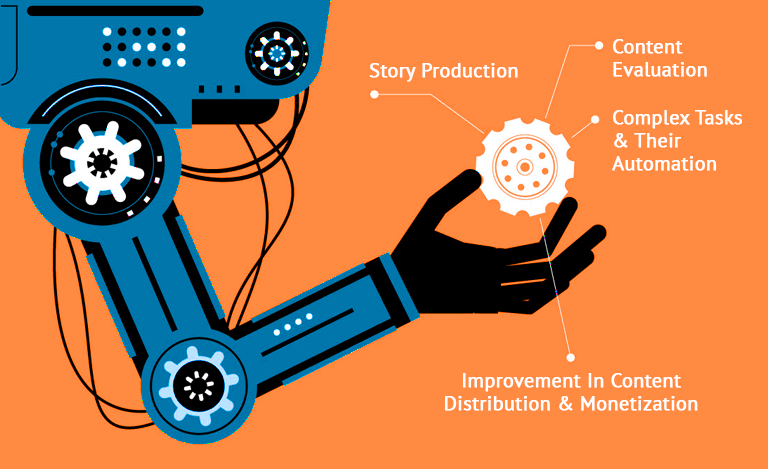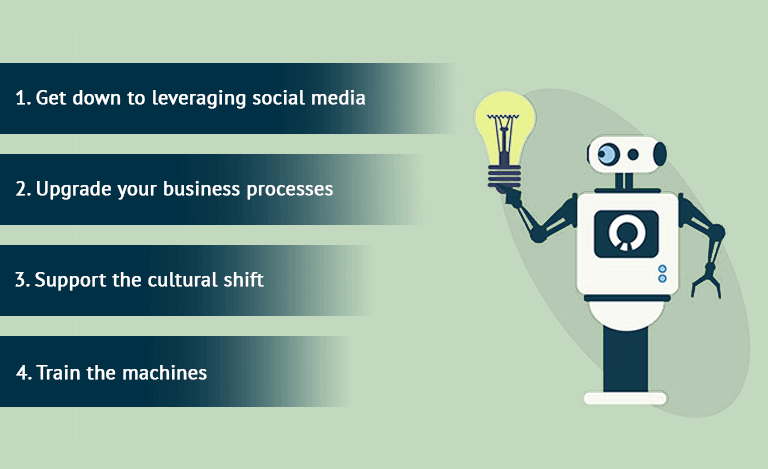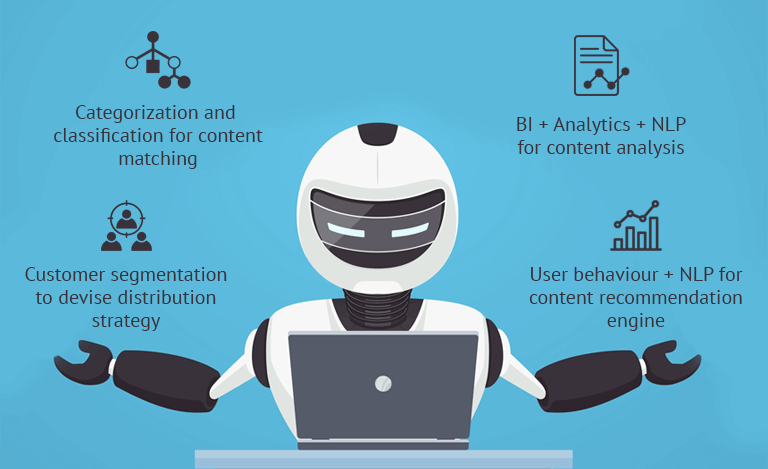
Will AI replace humans in the near future? That’s one of the raging questions these days. Machines nowadays are getting smarter and more advanced, so much so that they have actually started outrunning human mind. Or have they? As smart as these machines are, there are still some areas that essentially require human intervention. Take ePublishing for example. While many believe that artificial intelligence is likely to take over activities like report writing and raw content analysis, it is very unlikely to replace high-level decision making tasks like editing. But what AI can definitely do is increase the productivity of the editorial staff. Repetitive tasks that don’t require creativity can be offloaded with the help of AI.
In fact, AI has found great potential in the ePublishing industry. A lot of publishers have already started employing it. For example, creating quarterly earnings reports for companies doesn’t require creativity, which is why it the perfect task for AI. Not just this, AI can also help you in improving the capability of your content distribution platform by helping you reach out to the widest audience with the most appropriate content. Well, advanced AI algorithms can actually make it happen and work wonders to help you refine your content publishing.
Let’s dig a little deeper into how AI is helping the publishing industry and how its future looks like.
How AI is changing the face of the publishing industry

-
Story production
This one is specifically for the news stories. News items must be accurate and detailed. For example, if you were to publish a report on Basketball league, your content will be based on statistics and game highlights. Analyzing and creating a detailed story will be best done with the help of AI. Some companies like Associated Press and others have already started employing this technique.
-
Content evaluation
Accurate content decisions are important if you wish to market your content right. Usually, such decisions are based on editors’ gut feeling or basic analysis. But it has to be a lot more than that. Machine learning can help authors and editors in analyzing book manuscripts and comparing the same to the bestsellers. This is known as intelligent editorial analysis where machines use complex algorithms to discover and identify the most marketable projects.
-
Complex tasks and their automation
Checking content before publishing can be a time-consuming process. Plus, you can’t afford any errors. AI can perfectly handle such tasks including source validation, fact checking, plagiarism check, etc. which may otherwise be difficult for humans. In fact, machine learning algorithms can specifically be designed to check for statistical errors and copied content.
-
Improvement in content distribution and monetization
A digital publisher needs an effective digital distribution platform that allows them to reach out to the widest possible audience for their content. Now, a secure content distribution platform with DRM solution is one of the prerequisites here. Plus, your distribution method must be effective enough to drive in some noticeable traffic and readers. AI, in this case, can help publishers come up with distribution schedules based on accurate data. For example, machine learning and classification methods can be used to determine what type of content resonates best with the publisher’s audience and at what time. If you’re a news publisher, you might want to lay more stress over trending stories at the time of content distribution. Whereas, if you’re a lifestyle publisher, you might actively want to look for evergreen stories for distributing as they’ll be a perfect fit to keep your audience engaged at all times. Such possibilities are easily identifiable with the help of machine learning.
Publishers! Prepare yourselves for what the future holds!

Artificial Intelligence does hold immense possibilities in the field of publishing, for sure, but this won’t lead to human effort becoming useless, not yet. In fact, content producers, human editors, journalists will continue to remain an important part of the content publishing process. Driving operational efficiency, scaling up, and generating sustainable revenue are some things that’ll be achievable with AI.
Complex tasks like the ones discussed earlier are already being handled by AI. The goal is to leverage AI to do more of that work so that the publishers can shift their focus to more important tasks like expanding social distribution, increasing monetization of content, etc. When content distribution is entirely powered by AI, publishers can easily determine an optimal channel, time, and strategy for content distribution that actually engages maximum audience and increases ROI for the published content.
All publishers need is to leverage the right technology and prepare themselves for what’s in store. Here are some things that’ll help:
-
Get down to leveraging social media
Publishers need to keep track of how readers engage with their content. AI will handle all your complex tasks without fail but you need to do your part too. For example, as a content creator, you need to take to social copywriting and work hard to incorporate SEO with your online publishing platform. Aim for social media growth and search engine optimization for building a larger reader base.
-
Train thy machines
When you leverage AI for the complex parts of your content publishing process, you are at the helm of affairs, instructing the machine to follow a certain protocol and a set of rules. But remember, these machines can’t take decisions all by themselves. For making predictions and decisions based on real-time data, they need effective human-machine collaboration. Only then will it be possible for them to add to your ROI and make content publishing and distribution more successful and productive for you.
-
Support the cultural shift
AI automation is here and for all the right reasons. The cultural shift may make you skeptical about using machines for certain work. But if given a chance, AI can actually add to your productivity and revenue. All you need to do is support this change and let it happen.
-
Upgrade your business processes
Since AI is capable of taking on all the work related to content publishing, scheduling, distributing, and curating, your effort is significantly reduced. The saved time and energy can thus be put to improve your business processes and optimize your content production workflow. You could also work on the overall design of your digital publishing platform to make your content more presentable.
NLP could be a complete game changer

NLP or Natural Language Processing is a part of AI which can change the face of ePublishing. NLP is basically related to understanding human language. Now, this one requires complex algorithm designing and programming to make machines understand the context in the right way. But if done right, it can help publishers in many ways. Some of the most common use cases for NLP are as follows:
- Building customer segments in accordance with their reading behavior and devising a distribution strategy based on real-time data.
- Using categorization and classification techniques to match ads to content and other 3rd-party ads to determine what works best for a specific type of content.
- Business Intelligence paired with Analytics, NLP, and published content can help in preparing powerful content analysis reports.
- NLP, when combined with real-time user behavior, can be used to power a content recommendation engine. This mechanism can be embedded in a content distribution platform which will work great to keep readers hooked.
AI is the future. And the publishing industry is no exception. As a publisher, there’s a lot you can gain if you use AI/ML in the right way. Enhance your content performance and increase your revenue along with significantly saving your time.
Get The Most Out Of ePublishing with OneRead
With Artificial Intelligence in the picture, you’ll need a digital publishing platform that makes it easy for you to embed machine learning algorithms and make content distribution far more effective and powerful. You can even get a white-labeled reader app designed which can be paired with analytics to track real-time user behavior. You’re just a mail away from effective online digital publishing. Write to us at info@one-read.com to kick this into top gear.




